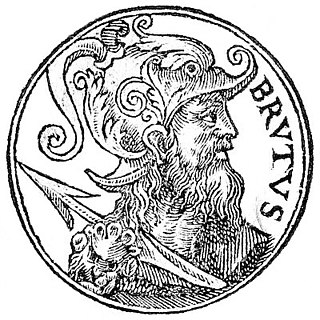Related Research Articles

Brutus, also called Brute of Troy, is a mythical British king. He is described as a legendary descendant of the Trojan hero Aeneas, known in medieval British legend as the eponymous founder and first king of Britain. This legend first appears in the Historia Brittonum, an anonymous 9th-century historical compilation to which commentary was added by Nennius, but is best known from the account given by the 12th-century chronicler Geoffrey of Monmouth in his Historia Regum Britanniae.

Lud, according to Geoffrey of Monmouth's pseudohistorical History of the Kings of Britain and related medieval texts, was a king of Britain in pre-Roman times who founded London and was buried at Ludgate. He was the eldest son of Geoffrey's King Heli, and succeeded his father to the throne. He was succeeded, in turn, by his brother Cassibelanus. Lud may be connected with the Welsh mythological figure Lludd Llaw Eraint, earlier Nudd Llaw Eraint, cognate with the Irish Nuada Airgetlám, a king of the Tuatha Dé Danann, and the Brittonic god Nodens. However, he was a separate figure in Welsh tradition and is usually treated as such.

Cadwaladr ap Cadwallon was king of Gwynedd in Wales from around 655 to 664 or 682. He died in one of two devastating plagues that happened in 664 and in 682. Little else is known of his reign.
Gwendolen, also known as Gwendolin, or Gwendolyn was a legendary ruler of ancient Britain. She came to power in 1115BC.
Maddan was a legendary king of the Britons as accounted by Geoffrey of Monmouth. He came to power in 1100BC. He was the son of King Locrinus and Queen Gwendolen, who both ruled Britain separately.
Mempricius was a legendary king of the Britons, as recounted by Geoffrey of Monmouth. He came to power in 1060BC. He was the son of King Maddan, brother of Malin, and father of king Ebraucus.

Leil was a legendary king of the Britons as accounted by Geoffrey of Monmouth. He was the son of King Brutus Greenshield and came to power in 989BC.
Rud Hud Hudibras was a legendary king of the Britons as recounted by Geoffrey of Monmouth. He came to power in 974BC.

Leir was a legendary king of the Britons whose story was recounted by Geoffrey of Monmouth in his pseudohistorical 12th-century History of the Kings of Britain. According to Geoffrey's genealogy of the British dynasty, Leir reigned around the 8th century BC, around the time of the founding of Rome. The story was modified and retold by William Shakespeare in his Jacobean tragedy King Lear.
Sisillius II was a Legendary King of the Britons as recounted by Geoffrey of Monmouth. He came to power in 373BC.
Morvidus was a legendary king of the Britons from 341 to 336 BCE, as recounted by Geoffrey of Monmouth. He reigned from 355BC. He was the illegitimate son of Danius by his mistress Tangustela.
Archgallo was a legendary king of the Britons as recounted by Geoffrey of Monmouth. He ruled from 339BC. He was the second son of King Morvidus and brother of Gorbonianus.
Elidurus the Dutiful was a legendary king of the Britons as recounted by Geoffrey of Monmouth. He reigned in the late fourth century BC. He was the third son of King Morvidus and brother of Gorbonianus, Archgallo, Ingenius, and Peredurus.
Idvallo was a legendary king of the Britons as recounted by Geoffrey of Monmouth. He came to power in 287BC.

Historia regum Britanniae, originally called De gestis Britonum, is a pseudohistorical account of British history, written around 1136 by Geoffrey of Monmouth. It chronicles the lives of the kings of the Britons over the course of two thousand years, beginning with the Trojans founding the British nation and continuing until the Anglo-Saxons assumed control of much of Britain around the 7th century. It is one of the central pieces of the Matter of Britain.
Coilus was a legendary king of the Britons during the time of the Roman occupation of Britain as recounted in Geoffrey of Monmouth's pseudohistorical Historia Regum Britanniae. He came to power in 142AD.
Caradocus, according to Geoffrey of Monmouth's Historia regum Britanniae, a pseudohistorical account of the kings of the Britons, was the duke of Cornwall under the reign of Octavius, who became king of Cornwall and died during the Emperor Magnus Maximus' reign.
Gorbonianus was a legendary king of the Britons as recounted by Geoffrey of Monmouth. He came to power in 349BC. He was the eldest son of King Morvidus, and the brother of Archgallo, Elidurus, Ingenius, and Peredurus.
Keredic was a legendary king of the Britons, as recounted by Geoffrey of Monmouth. The origin of Geoffrey's character is unknown, but he is not depicted as a Saxon. According to Geoffrey, Keredic's rule was so unpopular that the Saxons enlisted the aid of an army of Vandals from Ireland to drive him from his kingdom.

Alba Silvius was in Roman mythology the fifth king of Alba Longa. He was the son of Latinus Silvius and the father of Atys. He reigned thirty-nine years.
References
- ↑ Monarchie Nobelesse website, Bretons
- 1 2 Geoffrey of Monmouth: The History of the Kings of Britain : an Edition and Translation of De Gestis Britonum (Historia Regum Britanniae), Boydell & Brewer, 1 Jan 2007, p.44.